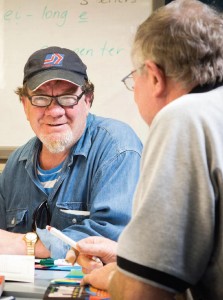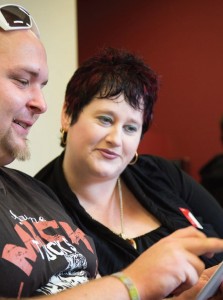 For those with a criminal record or trying to adjust to life after prison, poor literacy is a burden that can make rehabilitation that much harder.
For those with a criminal record or trying to adjust to life after prison, poor literacy is a burden that can make rehabilitation that much harder.
A Tasmanian adult literacy program helps former prisoners and offenders get back on their feet.
Most of the offenders who arrive at Community Corrections Centre in Hobart to get help with their literacy aren’t there voluntarily. Some are there because a court has ordered them to attend or because their probation officer has recommended it or simply because it will help to keep them out of jail.
‘It’s a matter of finding the hook, the thing that will motivate them,’ Norman Alexander, literacy coordinator-Justice says. ‘I tell them “I need to hear what you want to learn”. They find that incredibly liberating. They might say, “I want to be able to read to my kids”. One young fellow saw me signing a form and he pointed at my signature and said, “I’d love to be able to do that!”
Tasmania’s network of literacy coordinators
Norman is one of three literacy coordinators in the state’s LINC network who work with justice system clients at Risdon Prison and Community Corrections in the North/NW and South.
Literacy skills are generally measured by a person’s ability to use and understand the information they need to function in everyday life. Without good literacy skills, life is much harder.
‘People develop incredible mechanisms to cope with poor literacy. The prospect of going to Centrelink and filling in a form for example can be very intimidating, so people find ways around it. They might say they’ve forgotten their glasses so someone else has to help them, or they might say they have to leave to pick up the kids and they’ll take the form home. For a while the strategies they use work for them. They might take a form home and get their wife/girlfriend/dad to read and fill it out for them. But they also might avoid doing it all together which creates all kinds of extra problems.’

Avoiding situations where reading or writing are required can mean people aren’t able to access resources and programs such as vocational re-training, personal development programs like anger management or drug rehabilitation. Without access to these support services and assistance, they are more likely to end up in trouble with the law.
But getting reluctant learners to admit to a problem they find shameful and embarrassing can be difficult, especially given so many were unsuccessful at or hated school. Norman keeps the initial assessment meeting as informal as possible.
‘Asking a whole bunch of questions or putting pen to paper can be very off-putting for people. It can really scare them off.’
Matching tutor and learner
Once assessed, Norman matches each person with a tutor for 20 weekly sessions. Individual tutoring rather than a group or classroom approach ensures tutors can focus on helping reluctant learners overcome barriers and make progress.
‘Their self-confidence and self-concept change and theystart to feel great. They gain confidence in themselves as learners. Literacy improves the quality of life people can enjoy. They can participate in society and can give something back instead of being looked down on, and that can be quite a profound shift.’
Many learners continue with their tutoring after their court order has expired or when attendance is no longer mandated. The goal is to help them make the transition from individual tutoring to group literacy classes and beyond.
‘Once they get to see what TAFE has to offer – training in retail, hospitality, barista work, carpentry, almost anything,really, they suddenly see the possibilities and a different path ahead.’
Currently seven learners are attending pre-certificate and certificate level classes at TasTAFE, and two are in university preparation programs.
‘Literacy gives people choices,’ Norman says. ‘It gives people a sense that life can be different to what it used to be, that they can develop skills and knowledge to have a life they never thought they would. It acts as a circuit breaker.’
Don’s story
Don, 40, first came to Community Corrections seven years ago after being referred from a drug treatment program. ‘He was an absolute mess. He was very flighty and nervous and couldn’t focus or concentrate. He couldn’t write any more than his name.’
Since he started one on one with a literacy tutor, Don’s become a conservation volunteer and has joined group classes at TasTAFE. He’s started breeding finches as a hobby. Don uses his new found literacy skills to write notes to himself to inspire him to comply with his treatment program and overcome ‘dark days’ and is hoping to do a Certificate 2 or 3 in Horticulture.
For the first time in many years Don feels that he has something to look forward to, and something to lose.
